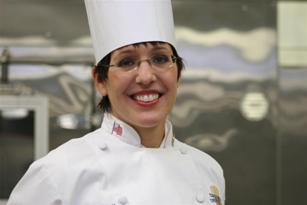Front of House: In Defense of Service—a Time to Refocus Our Teachings
30 January 2010By Audrey Heckwolf
 Why is what consumers experience much closer to ordinary than extraordinary? Are we to blame as educators?
Why is what consumers experience much closer to ordinary than extraordinary? Are we to blame as educators?
For the past 10 years I have made my living as a chef. As a chef, I need to advocate for the importance to possess the ability to provide excellent service more than expected. Too many chefs fail to understand that service is certainly as important—maybe even more important—than delicious food.
In an economy as dire as today’s, our guests have a multitude of choices to tempt and satisfy their palates. It is the service that can, and often does, set an establishment apart from its competitors.
Guests come to restaurants to dine, but also to get spoiled and feel special. Time and time again I find myself defending the importance of recognizing, patronizing and offering excellent service. As our program curriculum evolves, service classes are sadly becoming the casualties. While colleagues may argue that it is not the devaluing of service curriculum that is leading to the elimination of service curriculum, I would argue: How can it not be?
Certainly the hospitality industry continually changes, and new emerging trends need to be addressed. Accredited programs take great efforts to set the bar high and remain ahead of their craft. But if we examine the foundations of excellent service, they have remained unchanged. Are we going to stop teaching our students how to create mother sauces because there are more important lessons to fill our curriculums? I doubt it. So why are we viewing even the basics of guest service as disposable? Providing a sound, well-rounded hospitality foundation should remain our main goal as educators. It is only upon a strong foundation that greatness can be built.
Other than a few exceptions, our minds are intrinsically more complex than our palates. Does this mean that we are possibly more easily satisfied by the meals we eat than the way we are treated by others? I would suggest that, indeed, we are. So in an economy in which many businesses survive on their service mantras, why is it that, more often than not, what we as consumers experience is much closer to ordinary than extraordinary? Have we perpetuated this loss of excellence because of our numbness to how we are treated?
From and educator’s standpoint, I continually challenge my students to be the change that the industry needs. No longer should they accept anything less than extraordinary service. I explain that expecting excellence is a very real and attainable goal as long as they recognize that it can be defined differently from one establishment to the next.
Allow me to explain: At a fast-food restaurant, a warm greeting and accurate order may be deemed excellent service. At a fine-dining establishment, however, a warm greeting and an accurate order would hardly be considered reaching a level of excellence. I offer them the theory that it really does not matter if they are spending five dollars for a meal or $100. Dollar for dollar, they worked just as hard to earn the first five and the last five dollars. If our students begin to expect excellence in all service situations, they will inevitably train their future employees that mediocrity will not suffice when it comes to service. No detail will be too small. Simply, too many of our graduates are allowing their business plans to ignore the importance of service training and thus not allotting sufficient resources to train our staff. Is this their negligence or ours as educators?
The passage of time has shown us that culinary students seek out a variety of kitchen experiences. However, they will seldom search out service experiences. They fear the guest and their inability to meet the guest’s needs beyond the kitchen doors. Interesting, since it is the guest who provides a chef the opportunity to do what he or she loves.
We need to keep service classes in our programs. While students are in our programs, they remain a captive audience. We need to continue to require students to take both introductory and advanced service classes. At a minimum, the exposure offers our students the opportunity to develop a mutual respect and understanding between the dining room and kitchen. Let alone, the experience may open their eyes to so many other culinary careers that tend to be disregarded. Programs or courses that include service components offer a unique, and dare I say, invaluable, experience.
Serve on!
Audrey Heckwolf teaches advanced tableservice at The Secchia Institute for Culinary Education at Grand Rapids (Mich.) Community College.
